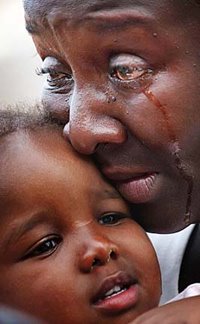The Mess After Katrina

Seven months after Hurricane Katrina, many New Orleans residents are still largely without jobs, emergency housing, flood protection, mortgage relief, and health care. African-American residents have been hit especially hard by the slow recovery—a recent Gallup poll reported that 53 percent of black respondents had lost "everything" in the wake of Katrina, as compared to 19 percent of whites.
To make things worse, according to the Brookings Institution, rebuilding has proceeded unevenly, and has exacerbated the racial and socioeconomic divides. "The [white, relatively upscale] French Quarter and Uptown, you see life basically as it was before the storm," said Matt Fellowes, a senior research associate at Brookings. "It's eerie, because life really is normal in those neighborhoods and then you cross over the Industrial Canal and enter the lower Ninth Ward or eastern New Orleans, and it looks like a bomb just went off yesterday." And it's possible that this is deliberate policy: Mike Davis has a piece in the Nation this week reporting that "mayor-appointed commissions and outside experts, mostly white and Republican, [are] propos[ing] to radically shrink and reshape a majority-black and Democratic city."
As many as 5,500 homes still need to be leveled in the lower 9th Ward alone., which means that a sizeable proportion of 9th Ward and Eastern New Orleans residents remain in temporary housing elsewhere around the country, and their displacement could have a lasting affect on the face of local politics. 500,000 African-American residents lived in New Orleans before Katrina; that number is now down to 200,000, which will drastically shift the balance of electoral power in the upcoming mayoral and city council elections. Nevertheless, this week a federal judge ruled that the elections will go on as usual, despite the fact that many former residents won't be able to participate.Bruce Gordon, President of the NAACP, appealed to Louisiana Governor Kathleen Blanco on election matters:
For far too long in Louisiana's history, voting has not been a right afforded to black citizens. Historically, the extension of voting rights to black citizens in Louisiana has been strongly resisted, whether through literacy tests, poll taxes, or other formal and informal practices combined to keep black voting rates in the state low. The impact of Hurricane Katrina now threatens Louisiana's African-American citizens' voting right in equally devastating ways."Less than 10,000 of New Orleans’ 297,000 registered voters have requested absentee ballots and the city of New Orleans may be on the verge of electing its first white mayor in nearly 30 years.
Posted by Juliana Bunim on 03/31/06 at 10:20 AM
Link Here




0 Comments:
Post a Comment
<< Home